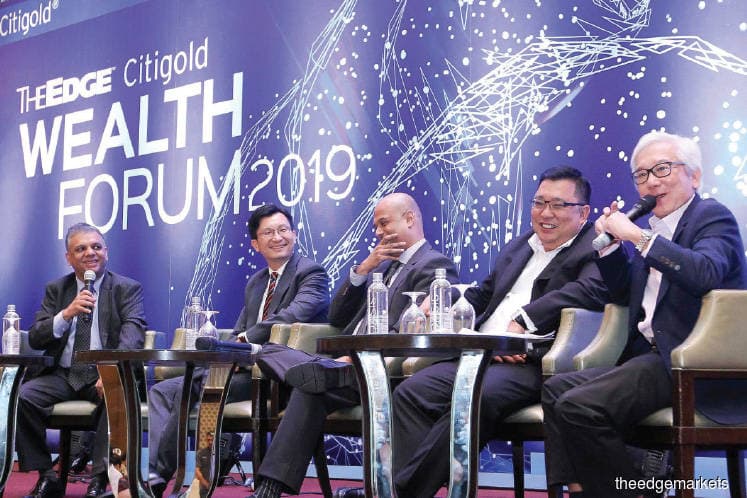
This article first appeared in The Edge Financial Daily on February 25, 2019
KUALA LUMPUR: Increasing geopolitical concerns are making the investment prognosis for 2019 unpredictable.
The key threats, such as the US sanctions policy on Iran, protectionism and trade war, populism and nationalism, were the main concerns at The Edge-Citigold Wealth Forum 2019 held at the Mandarin Oriental Hotel here on Saturday.
At the half-day forum themed “Ahead of the Curve” attended by more than 500 participants, Lee Lung Nien, chief executive officer (CEO) of Citibank Bhd, said navigating through the ongoing political instability will be the most crucial subject throughout the year.
“It is no longer about fundamentals. We talk about the US-China trade tensions, China’s growth, Brexit (Britain’s exit from the European Union), Donald Trump and other geopolitical risks. How do you hedge against these?
“[In light of these] how do we hedge our portfolios and how do we rebalance our portfolios against event-driven risks?” he posed.
The Edge Media Group publisher and group CEO Datuk Ho Kay Tat pointed out that last year was one that investors would rather forget as the global and domestic economies that began on a strong footing suffered severe setbacks.
“December turned out to be an ugly one as key stock market indices fell, some of them for several days in a row.
“After setting an all-time record high on Sept 20, the S&P 500 ended the year 6.2% down.
“The Dow Jones also closed down 5.6% for the year. [On the domestic front,] the FBM KLCI ended the year down 5.7% at 1,690.58, hitting its lowest point for the year on Dec 18 at 1,635.31 points,” said Ho.
While these concerns triggered worries of a global recession, Jai Tiwari, Citi’s foreign exchange strategist for Asia-Pacific, Europe, the Middle East and Africa, does not think they are likely. He pointed out that global economic indicators and corporate earnings revisions signify positive economic growth.
“Global growth will not fall off the cliff this year. We are downgrading it from 3.2% in 2018 to about 2.9% in 2019. This is not a very significant downward adjustment,” said Tiwari.
He added that earnings growth has been fairly steady. “We saw corporate earnings grow about 16% in 2018. We think that we will see it pulled back to about 10% in 2019,” Tiwari recommended investors to consider diversifying their portfolios across various asset classes — such as equities, fixed income, commodities and foreign currencies — to navigate the market uncertainties this year.
Apart from adopting a multi-asset strategy, Tiwari also said investors should look into the long-short strategy, where investors buy equities that are expected to increase in value and short-sell equities that are expected to decline in value.
Lu Wenjie, director of BlackRock Investment Management (Shanghai) Co Ltd, allayed fears of the short-term investment risk in China.
He said that even if the negotiation between the US and China fails, this is only expected to reduce the republic’s gross domestic product growth by between 0.2% and 0.3%.
The US and China placed hefty tariffs worth billions of dollars on each other last year as they faced off in a punishing trade war.
In the meantime, Lu said the Chinese government and its central bank could stimulate their economy by loosening monetary policies and speeding up infrastructure investments. “The short-term risk [of investing in China] is protected.”
The persisting trade war might even be good for China as the external pressure has the government speeding up on structural reforms such as enhancing intellectual property protection, providing fair treatment to local and foreign companies and opening up its large domestic market to the rest of the world, said Lu.
He added that if implemented effectively, these measures would benefit China in the long run.
Despite the frustrating trade talks, Franklin Templeton Multi-Asset Solutions’ Subash Pillai is still optimistic about the US market this year.
The Singapore-based managing director and regional head of client investment solutions for Asia-Pacific said that the firm is positive that the US corporate profit margins will continue to rise, and he sees this extending into the first half of 2019.
“This is a function of the tax cuts. What’s also important is that the US will benefit to a degree from the trade war and that has the ability to potentially move these expectations further.”
However, on the domestic front, the situation is still looking rather tepid. Teng Chee Wai, managing director of Affin Hwang Asset Management told the packed hall that he is broadly downbeat about local equities.
“I don’t see Malaysian market rising as much as other markets in Asia right now. This can be construed as a silver lining of sorts. If other markets fall, Malaysia will not fall as much.
“Then again, if international markets rise, we will not rise as much either.”
Corporate earnings in Malaysia are expected to stay modest for the foreseeable future.
“Before the 14th general election in May, the market projected earnings growth of about 8%. However, we ended up experiencing close to no earnings growth throughout 2018.
“Meanwhile, 2019 earnings growth expectation is hovering between 5% and 6%, subject to further revision.”
During the panel discussion, Teng added that more engagement between the newly elected government and the private sector is needed.
“At the moment, we are seeing a lot of decisions being taken unilaterally without the private sector’s participation. I hope the government doesn’t treat the private sector like an enemy of the state. It is a contributing asset to nation-building. I think some of the new leaders ought to shed the socialist mindset that they have, because [business] people are willing to commit capital to develop their businesses,” said Teng.